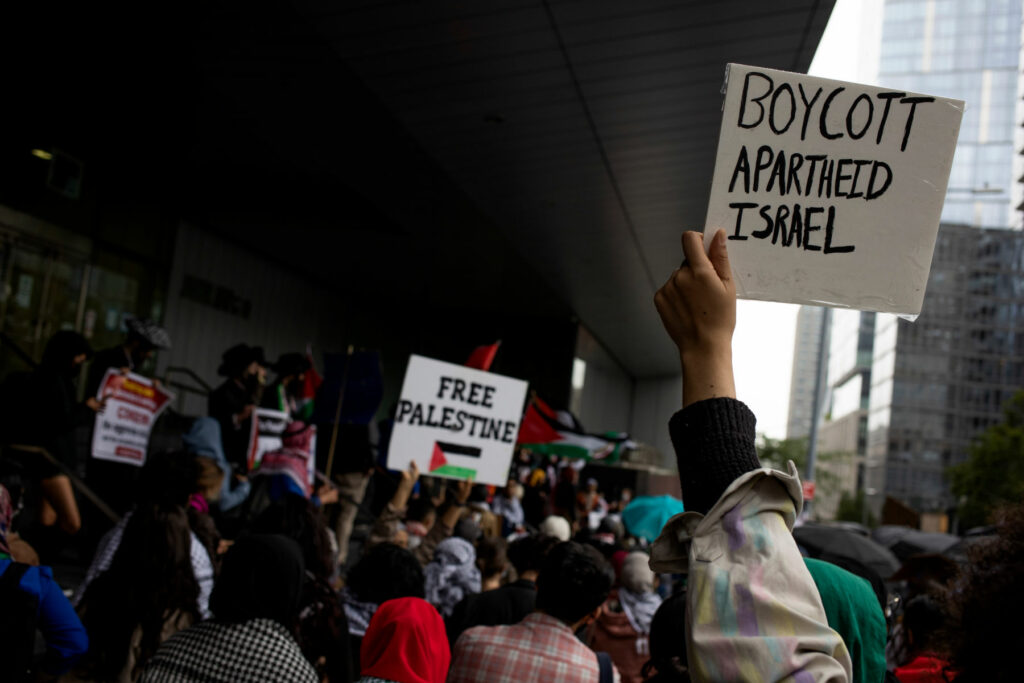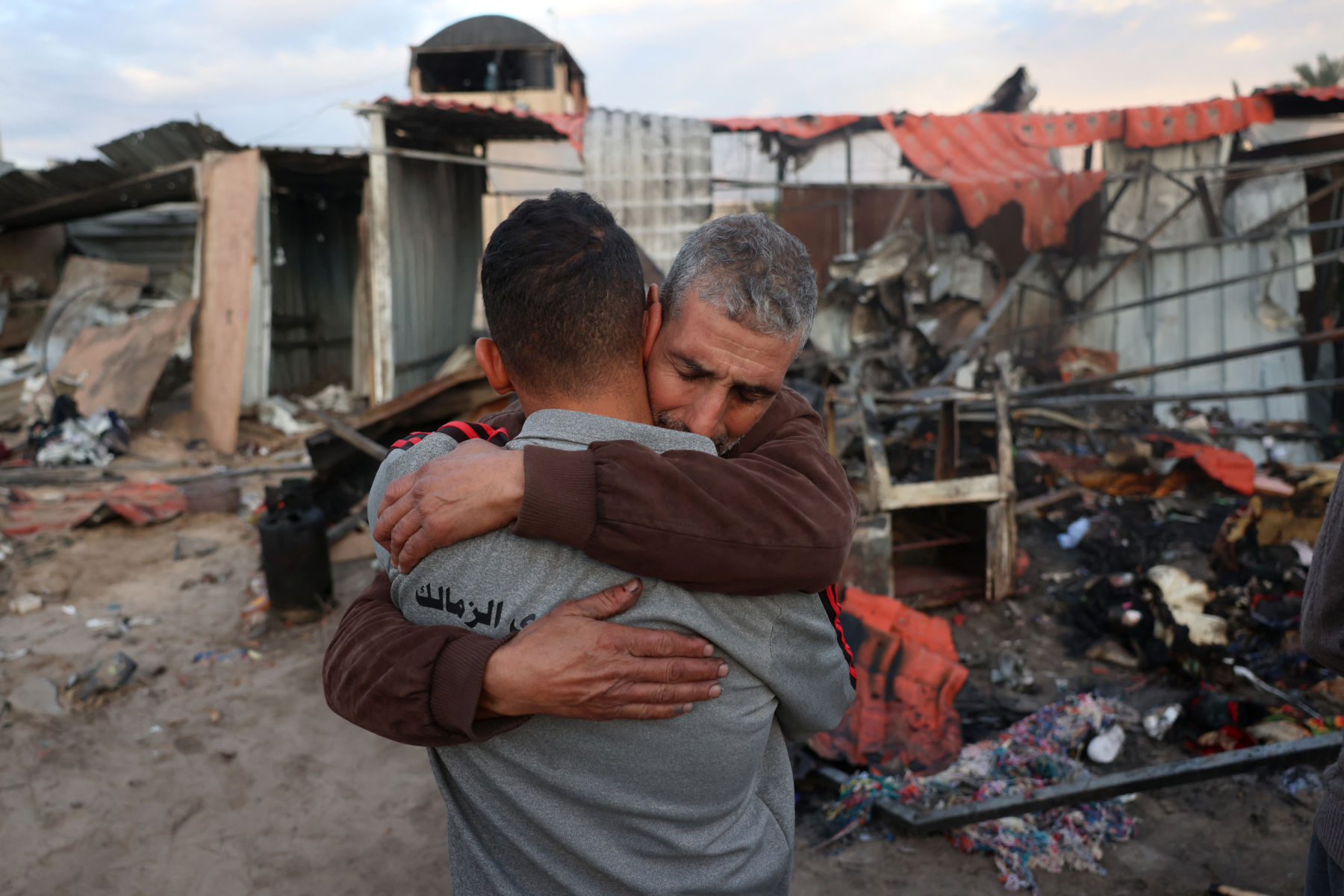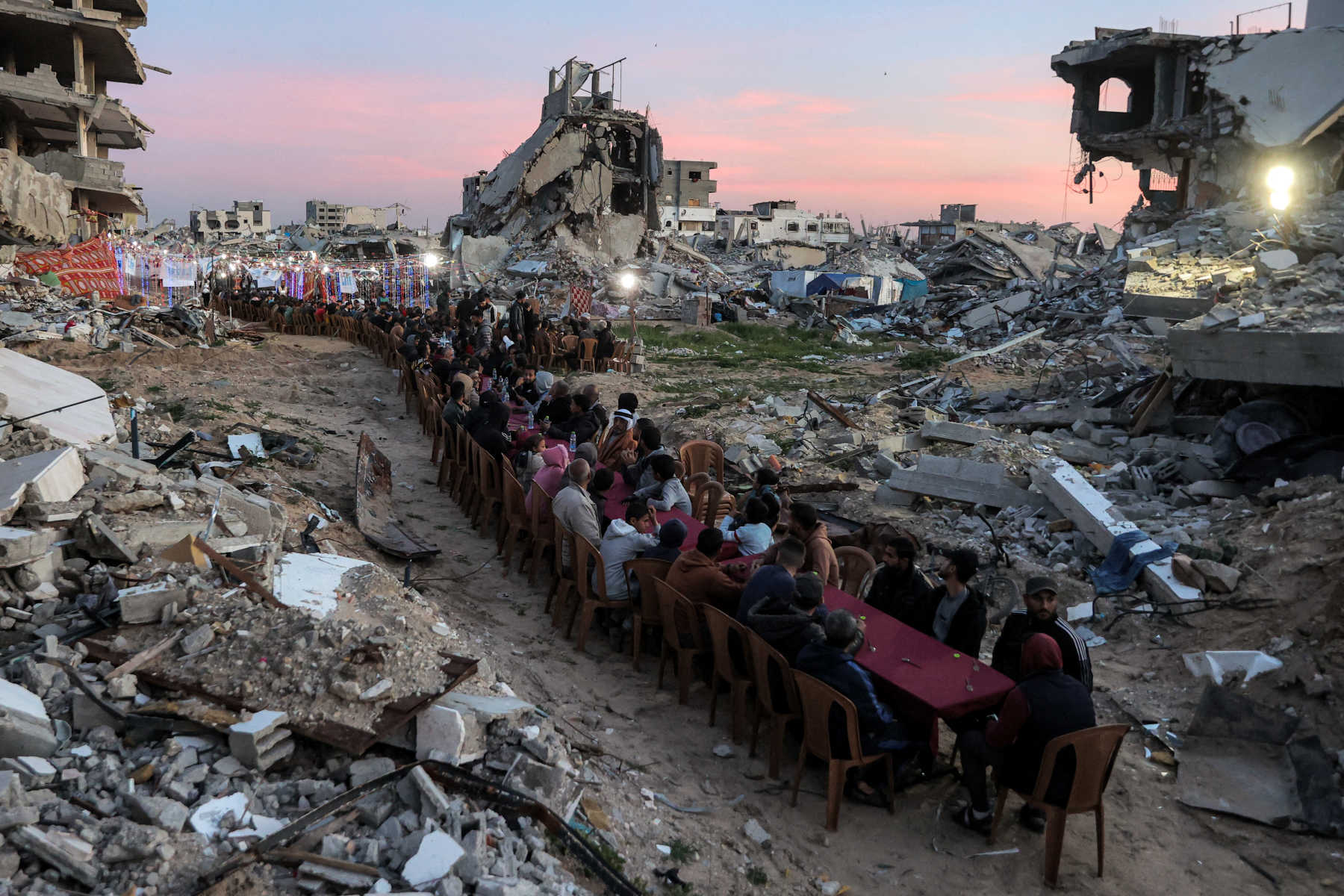Juan Cole is the Richard P. Mitchell Collegiate Professor of History at the University of Michigan. He is also a non-resident fellow at DAWN and a non-resident fellow at the Center for Conflict and Humanitarian Studies in Doha.
Israel's total war on Gaza, following Hamas's horrific terrorist attack on Oct. 7, has roiled higher education in the United States. The atrocities committed by Hamas in southern Israel two months ago have reverberated on many U.S. campuses, deeply traumatizing many Jewish students. But so too has Israel's massive military response in Gaza, which has been equally shocking to Palestinian-American, Arab American and Muslim American students, among many others.
In the heated atmosphere prevailing since then, questions have arisen about the limits to free speech in the classroom, among student and faculty organizations, and on the social media accounts of university members, from professors to administrators. Often, these charged debates reflect the advent of significant numbers of minority students on university campuses, some from the post-1965 immigration wave, who view the Israel-Palestine conflict very differently than the white majority on many campuses, as a recent Gallup poll demonstrates. These controversies also reflect the efforts of special interest groups and outside organizations, such as the Anti-Defamation League, to discipline campus speech and brand some of it as support for terrorism.
Some of these campaigns have attempted to silence Palestinian-Americans and their perspectives outright. In October, Florida governor and Republican presidential candidate Ron DeSantis ordered all public universities in the state to derecognize Students for Justice in Palestine chapters on their campus. The move came after the organization issued a "toolkit" for understanding the context of the Oct. 7 attacks, in which they characterized Hamas as a resistance organization. The SJP insisted that its student members are part of the resistance, not merely in solidarity with it. DeSantis's order immediately provoked threats of civil lawsuits that would personally name university officials participating in the shutdown. Emma Camp at Reason magazine reported that as a result, the Chancellor of the University of Florida system, Ray Rodrigues, announced that he was backing off any action against SJP, though he did hold out the possibility that the university would require the group to pledge nonviolence and disassociate itself from Hamas. The Foundation for Individual Rights and Expression, a civil liberties group, immediately pointed out that that requirement would also be unconstitutional.
But that did not stop the Anti-Defamation League and the Louis D. Brandeis Center for Human Rights Under Law from taking up DeSantis's program, writing a letter to university presidents pressuring them to close down SJP chapters on the grounds that the group gave material assistance to terrorism (a charge the letter does not substantiate). Under U.S. law, "material assistance" involves training, expert advice or assistance, service and personnel. Given that the SJP is not hosting training camps for Hamas fighters or actively advising the organization on tactics, the letter is nonsensical and, in a just world, would be found libelous.
Clearly, some pro-Israel and avowedly Zionist organizations would like to substitute pro-Palestinian sentiments today for the Communism of the 1940s and 1950s, and to tag any advocate of Palestinian rights as a terrorist.
- Juan Cole
Ironically, critics such as Emmaia Gelman, a scholar and longtime Jewish left activist, have argued that the ADL, despite representing itself as a force against bigotry, "has a long history of wielding its moral authority to attack Arabs, blacks, and queers." The actual charge against the SJP is apparently that it makes an effective case for the liberation of Palestinians from Israeli occupation, a case the ADL brands a form of hate speech against Jews. Some of this controversy derives from a desire by Israeli nationalists and those who support its nationalist narrative to avoid granting to the Palestinians any legitimacy and to avoid any talk of Israeli occupation of Palestinian territory—even though the term "occupation" is right out of international law.
The SJP has run into trouble from other university administrations. It and the campus chapter of Jewish Voice for Peace were suspended until the end of fall semester at Columbia University on the vague basis of "threatening rhetoric and intimidation," in a an arbitrary decision-making process that does not appear to follow the university's own guidelines, as the indispensable Committee on Academic Freedom at the Middle East Studies Association reported. Brandeis University, predictably, also banned SJP. One of its grounds was that SJP members chanted slogans such as "From the river to the sea, Palestine will be free," which Brandeis administrators called antisemitic—even though it says nothing about Jews at all. As Yousef Munayyer has written, the phrase instead "encompasses the entire space in which Palestinian rights are denied" and "is a rejoinder to the fragmentation of Palestinian land and people by Israeli occupation and discrimination." Why, anyway, would Israel want millions of Palestinians to be permanently unfree?
At the College of Education at the University of Arizona, two professors, Rebecca Zapien and Rebecca Lopez, were suspended with pay for several weeks—before being reinstated on Dec. 1—after a student provided audio recordings of their class to a pro-Israel organization, which posted them to social media. Snippets claimed to show them comparing Hamas to the Black Panthers as a "resistance group," though the two professors said that the recordings had been selectively edited and misrepresented the full class discussion. Their suspension provoked demonstrations and protests, including by the United Campus Workers of Arizona union. Maha Nassar, an associate professor of modern Middle East history at the university, criticized their suspensions for sending "a chilling message to UA students, staff and faculty who believe in Palestinian freedom, dignity and human rights."

A chastened dean of the College of Education, Robert Berry, admitted the difficulties of teaching controversial contemporary issues and pledged a series of workshops, including some by Middle East and Judaic Studies faculty (who surely should have been consulted in the first place). Activist groups attempting to get professors and other instructors punished or even fired play on the ignorance of most university administrators about the complex and contested history of the Middle East and of the Israel-Palestine conflict in particular, claiming that certain legitimate assertions about this history make some students "feel unsafe."
Given the long hangover in American culture from the George W. Bush-era War on Terror, characterizing a group that engages in terrorist tactics—that is, targeting civilian noncombatants for political purposes—as a resistance movement can clearly provoke quick condemnation and even sanctions. Yet no historian would dispute that the militant National Liberation Front in Algeria was a resistance movement fighting French colonialism from 1954 until Algeria won its independence in 1962, and that it carried out terrorist attacks as part of its tactics. The Bush administration's success in making the word "terror" refer to individuals, organizations and states themselves—rather than to a tactic—has hopelessly muddied the waters.
The Revisionist Zionists who resisted British rule in Mandate Palestine—and promoted the idea of a Greater Israel across all of historic Palestine, as well as both sides of the Jordan River—engaged in terrorism. The Irgun, its paramilitary group, notoriously blew up the King David Hotel in Jerusalem in 1946, killing over 90 civilians, and mowed down Palestinian villagers in the massacre at Deir Yassin in 1948 during the Jewish insurgency that preceded Israel's independence. Most Revisionist Zionists gave up terrorism as a tactic in independent Israel, coalescing into civil political parties such as the right-wing Likud of Prime Minister Benjamin Netanyahu. Members of the Likud see the terrorism of their forebears as a form of political resistance, a view that has outraged the British government.
Hamas, for its part, evolved out of al-Majma` al-Islami of the 1970s and 1980s, an Islamic charity that had mainly provided public services in Gaza, such as soup kitchens for the poor. Hamas, founded in 1987, could have resisted the ruinous Israeli occupation and economic blockade on the Gaza Strip in ways other than slaughtering grandmothers and concertgoers in Israel. But it is also possible to categorize Hamas as a longstanding resistance movement while admitting that, on Oct. 7, its leadership conducted a brutal and horrific terrorist attack that put it beyond the pale.
Even well-meaning gestures by university administrators have backfired. The president of the University of California system, Michael V. Drake, reacted to this crisis on campus by pledging $7 million in funding for staff training and resources, putting $2 million toward an initiative to "develop educational programs at each UC campus … focused on better understanding anti-Semitism and Islamophobia, how to recognize and combat extremism, and a viewpoint-neutral history of the Middle East." It was that last point, on "viewpoint-neutral history," that led some 150 professors across the UC system to respond with a open letter condemning the plan as a violation of their academic freedom. Drake, who has degrees in medicine and management, couldn't have been more naïve about scholarly debates over historiography and pedagogy in the modern discipline of history and the social sciences.
"We find your use of the term 'viewpoint-neutral history' to be wrong in this context and call upon you to rescind it," the professors wrote in protest. "We are aware that the concept of viewpoint neutrality is a legal term of art rooted in the First Amendment of the U.S. Constitution that prevents the government from either supporting or discriminating against certain viewpoints. There is a clear, structural difference between government agencies avoiding the endorsement of a particular political position and university-based professionals presenting conflicting viewpoints as a normal part of our curriculum."
The modern American university was envisaged by its founders as an arena of democratic inquiry and debate.
- Juan Cole
The modern American university was envisaged by its founders as an arena of democratic inquiry and debate. "Since freedom of mind and freedom of expression are the root of all freedom, to deny freedom in education is a crime against democracy," said the philosopher and scholar John Dewey, perhaps America's most influential thinker on education. Dewey famously made a distinction between those who saw education as an instrument for the transmission of fixed ideas and those for whom it was a means to provoke constant inquiry and critical judgment. Drake appears to fall into the former category, assuming it is possible to teach Middle Eastern history in California as a transmission of value-free and uncontested truths.
Dewey's naïve universalism, however, focused on speech about abstract principles and disregarded the dimensions of speech that are grounded in distinctive cultural values and that instigate to action, as Stanley Fish argued during an earlier culture war. As a practical matter, in the United States, where freedom of speech has extremely strong protections from the state in the First Amendment, courts have usually felt comfortable limiting speech only where its consequences are not long term or merely emotional but where it forms a clear and immediate danger to the public—where the speech consists of "fighting words" meant to incite violence.
In the past 80 years, attempts have been made to outlaw dissident speech that, its critics feared, might lead to the overthrow of the government, as with Communism in the Red Scare of the 1950s. Ultimately, however, the Supreme Court struck these efforts down, deeming the mere holding of Marxist beliefs to be an advocacy of abstract principles rather than a call to immediate action. In this century, these issues have, worryingly, recurred in relationship to terrorism and material support for a terrorist organization. Clearly, some pro-Israel and avowedly Zionist organizations would like to substitute pro-Palestinian sentiments today for the Communism of the 1940s and 1950s, and to tag any advocate of Palestinian rights as a terrorist.
University administrators, however, have the duty to care for their Palestinian, Arab and Muslim students as much as their Jewish ones, and to recognize that many other students of color, as well, are deeply traumatized by an Israeli war against an entire population of 2.2 million Palestinians in the besieged Gaza Strip. As always, the best antidote to poor analysis or hurtful rhetoric—that is, to bad speech—is not censorship but more and better speech. The University of California professors were exactly right in their recent letter: "As historians we maintain that among our contributions to a democratic society and a more peaceful world is to teach students the skills to evaluate different points of view based on evidence, rigorous inquiry, best pedagogical practices, and peer-reviewed scholarship free from external interference and political pressure," they wrote. "Indeed, this is the very foundation of our collective craft and a core principle of academic freedom."





































